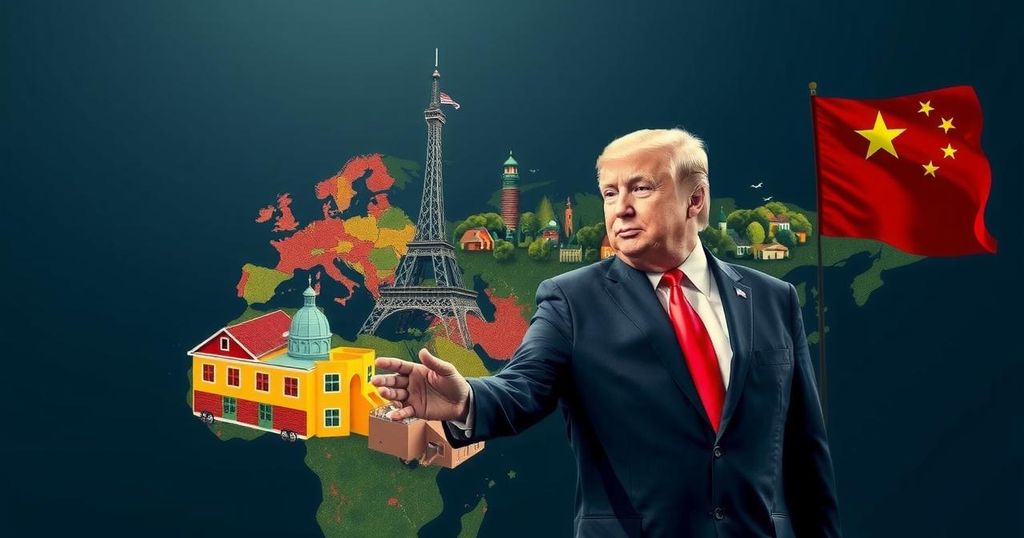As Donald Trump is poised to return to the presidency, China aims to assert itself as a global leader in climate diplomacy during the ongoing COP29 talks in Baku. While emphasizing its international climate finance contributions, China resists classifications as a donor nation. Experts suggest that Trump’s return may create opportunities for China to portray itself as the more responsible power in climate initiatives, especially if U.S.-China relations deteriorate.
With the anticipated return of Donald Trump to the White House, China perceives a significant opening to establish itself as the leader in global climate policy, particularly against the backdrop of Trump’s expected withdrawal from international climate diplomacy. During the COP29 climate talks in Baku, China has taken steps to present a more collaborative image, for the first time outlining its international climate financing contributions while firmly resisting classifications as a donor nation, which would entail stricter accountability measures. In contrast to previous tensions at COP28 in Dubai, where China and former U.S. envoy John Kerry attempted to usher in a cooperative spirit, the future of U.S.-China relations regarding climate is uncertain. With both nations contributing to 41 percent of global greenhouse gas emissions, expectations are low for continued amicable interactions if Trump returns, as he is a vocal skeptic of climate change initiatives and international assistance. Belinda Schaepe, a China analyst at the Centre for Research on Energy and Clean Air in London, indicated that Trump’s presidency would allow China to enhance its portrayal as a responsible global leader. “It makes it easy for China to portray itself as the more responsible global power of the two,” said Schaepe. She emphasized the need for China to make more ambitious commitments regarding climate aid and emissions reduction leading up to 2035. During the ongoing discussions, wealthier countries are urged to surpass the $100 billion annual aid goal aimed at supporting poorer nations affected by climate change. China has consistently resisted being labeled a donor, a designation that would require it to adhere to stricter reporting standards. However, Vice Premier Ding Xuexiang announced at the talks that China has distributed $24.5 billion towards international climate finance since 2016. German negotiator Jennifer Morgan reiterated this impressive contribution while stressing the importance of transparent reporting. Commenting on potential aid provisions, Susana Muhamad, Colombia’s environment minister, advocated for equitable contributions aligned with national capacities, noting that other nations, including Gulf states, should also play their part. If the United States retracts from the Paris Agreement post-Trump’s election, she believes that other nations will emerge to take on significant climate leadership roles and acknowledged China’s commitment to multilateral efforts. China’s urgency to address its environmental issues aligns with its ambition to emerge as a leader in renewables, where it has made substantial advances in electric vehicles and solar energy technology. Political analyst Li Shuo suggested that despite potential complications in US-China relations during Trump’s tenure, it could also facilitate more strategic negotiations, especially if the US assumes a more extreme stance.
The topic addresses the strategic positioning of China in climate diplomacy, especially in light of the anticipated return of Donald Trump to the presidency. The article discusses the dynamics at the COP29 climate talks as China attempts to strengthen its role as a global leader in climate initiatives while highlighting the potential pitfalls and challenges presented by a Trump-led United States. The complexities of international climate funding and the status of nations as donors or developing countries are also explored in this context.
In conclusion, the anticipated return of Donald Trump sets the stage for China to ascend as a prominent player in climate leadership on the global stage. As the country navigates the forthcoming challenges and responsibilities of international climate finance, its actions and commitments will significantly impact the dynamics of climate diplomacy. Stakeholders are watching closely, recognizing that China’s approach could redefine global environmental leadership amidst shifting geopolitical landscapes.
Original Source: www.france24.com




